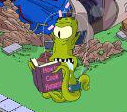|
|
| Line 1: |
Line 1: |
| | {{Incomplete}} | | {{Incomplete}} |
| | + | {{Italic title}} |
| | '''''The Twilight Zone''''' is an American {{w|Anthology series|anthology}} television series that was created by [[Rod Serling]]. The {{w|The Twilight Zone (1959 TV series)|original series}} aired from 1959 to 1964. A {{w|Twilight Zone: The Movie|film adaptation}} appeared in 1983, consisting of remakes of three of the original series episodes and one new story. A {{w|The Twilight Zone (1985 TV series)|revival TV series}} aired for three television seasons, from 1985 to 1989. Later, a {{w|The Twilight Zone (2002 TV series)|second revival series}} was made, but was not as successful and lasted only one season (2002-2003). | | '''''The Twilight Zone''''' is an American {{w|Anthology series|anthology}} television series that was created by [[Rod Serling]]. The {{w|The Twilight Zone (1959 TV series)|original series}} aired from 1959 to 1964. A {{w|Twilight Zone: The Movie|film adaptation}} appeared in 1983, consisting of remakes of three of the original series episodes and one new story. A {{w|The Twilight Zone (1985 TV series)|revival TV series}} aired for three television seasons, from 1985 to 1989. Later, a {{w|The Twilight Zone (2002 TV series)|second revival series}} was made, but was not as successful and lasted only one season (2002-2003). |
| | | | |
Revision as of 20:39, October 6, 2017

|
This article or section is incomplete.
Please improve the article, or discuss the issue on the talk page.
|
The Twilight Zone is an American anthology television series that was created by Rod Serling. The original series aired from 1959 to 1964. A film adaptation appeared in 1983, consisting of remakes of three of the original series episodes and one new story. A revival TV series aired for three television seasons, from 1985 to 1989. Later, a second revival series was made, but was not as successful and lasted only one season (2002-2003).
In addition to television and film, The Twilight Zone has been made into video games, a pinball machine, comic books, and graphic novels. Also, numerous Twilight Zone short stories exist, both episode adaptations and original stories by Rod Serling and other authors.
The Twilight Zone was notable for its genre-spanning story repertoire, running the gamut from science fiction to suspense, fantasy, thriller, and psychological horror. The stories often concluded with a twist ending and usually a moral.
The Twilight Zone has been referenced many times on The Simpsons.
References to The Twilight Zone in The Simpsons
Episodes
| Picture
|
Season
|
Episode number
|
Episode name
|
Reference
|
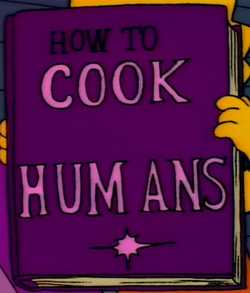
|
2
|
016
|
"Treehouse of Horror"
|
When Lisa snoops on the Rigellians' ship, she finds a cookbook whose title is eventually revealed to be How to Cook for Forty Humans, but first appears to be How to Cook Humans. The book is a reference to the Twilight Zone episode "To Serve Man" where aliens greet people with a book titled To Serve Man, as revealed when it's translated. The curious people accept the aliens' invitations to see their homeworld, and they travel with the aliens on their spaceships. One woman accepts such an invitation, but is stopped by her brother, who has properly translated the book and is shouting "It's a cookbook! It's a cookbook!".
|
|
|
3
|
042
|
"Treehouse of Horror II"
|
The introduction in Bart's nightmare is based on Rod Serling making the introduction to the Twilight Zone episodes. Also, Bart's nightmare is largely based from the "It's a Good Life" segment of The Twlight Zone Movie.
|
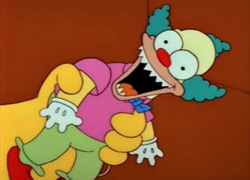
|
4
|
064
|
"Treehouse of Horror III"
|
The first segment, "Clown Without Pity", is an overall spoof of the Twilight Zone episode "Living Doll".
|
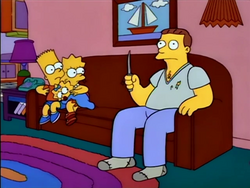
|
5
|
087
|
"Marge on the Lam"
|
Lionel Hutz's line, "This isn't the YMCA", appears to be a reference to the The Twilight Zone episode "Person or Persons Unknown", in which the protagonist snidely remarks at one point, "What? This isn't the YMCA?".
|
| 250px
|
6
|
117
|
"Bart's Comet"
|
Everyone getting angry and wanting to come into Flander's shelter is a reference to The Twilight Zone episode "The Shelter".
|
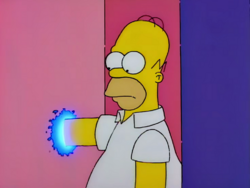
|
7
|
134
|
"Treehouse of Horror VI"
|
The portal is similar to The Twilight Zone episode "Little Girl Lost". When Homer first encounters the portal he says "It's like something from that Twilighty show about that Zone".
|
| 250px
|
8
|
154
|
"Treehouse of Horror VII"
|
"The Genesis Tub" is inspired by the 1962 Twilight Zone episode called "The Little People", where astronauts stumble upon a tiny civilization on an asteroid.
|
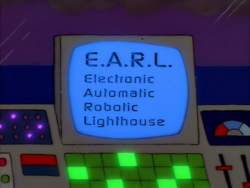
|
162
|
"El Viaje Misterioso de Nuestro Jomer"
|
E.A.R.L. being a robot rather than a human being is a reference to the The Twilight Zone episode "The Old Man in the Cave".
|
|
|
10
|
207
|
"Treehouse of Horror IX"
|
Plot of The Terror of the Tiny Toon references Twilight Zone: The Movie.
|
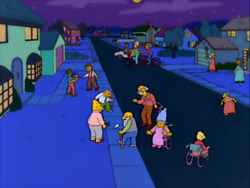
|
214
|
"Wild Barts Can't Be Broken"
|
The last scene with the elderly playing in the street is a reference to the Twilight Zone episode Kick the Can.
|
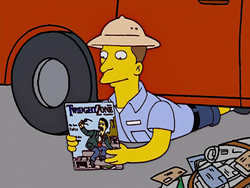
|
14
|
300
|
"The Strong Arms of the Ma"
|
When Marge runs over the mailman and tells him that it will take a while for help to arrive, he says it's no problem as he's got plenty to read and picks up a Twilight Zone magazine. Then, to his horror, he discovers that his glasses are broken, referencing the 1959 episode "Time Enough at Last". The music from the show plays after this.
|
| 250px
|
16
|
336
|
"Treehouse of Horror XV"
|
"The Ned Zone" segment is reminiscent of a Twilight Zone episode called "The Purple Testament", in addition to being a parody of the Stephen King novel The Dead Zone.
|
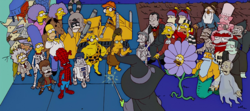
|
17
|
360
|
"Treehouse of Horror XVI"
|
The segment "I've Grown a Costume on Your Face" references Twilight Zone episode "The Masks", in which four greedy heirs are turned into monsters by the hideous masks each wears at their benefactor's behest.
|
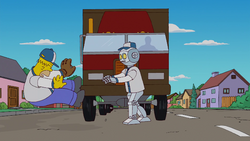
|
23
|
503
|
"Them, Robot"
|
The robot who saves Homer's life by pushing him out of the path of an oncoming truck (and being himself hit as a result) is like the self-sacrificing robot in The Twilight Zone episode, "I Sing the Body Electric".
|
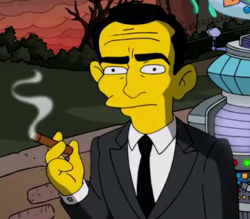
|
25
|
532
|
"Treehouse of Horror XXIV"
|
In the opening sequence, Rod Serling, creator and host of the original TV series, is seen smoking a cigarette.
|
|
Video games
External links













